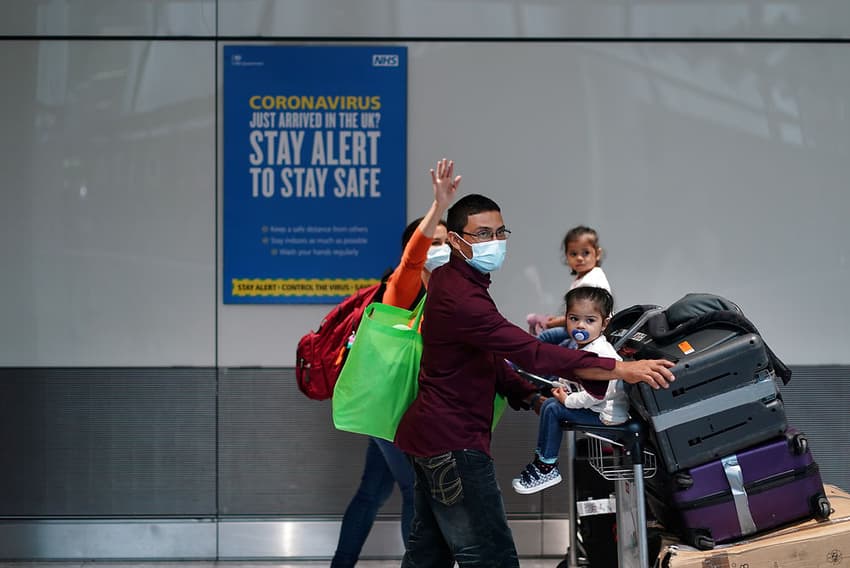Denmark residents again required to quarantine on UK entry

The United Kingdom has removed Denmark from its ‘travel corridor’ list of countries for which quarantine requirements are not applied.
The change took effect on Saturday September 26th and means that residents of Denmark who travel to England are now required to quarantine for 14 days on arrival.
This means that, after arriving in England, you must travel directly to the place you are staying and not leave until 14 days have passed. The UK terms this form of quarantine self-isolation. Further details of how to isolate can be found on the UK government website.
Although the UK’s coronavirus quarantine rules refer specifically to travel to England, the same rules currently apply in each of the other UK nations. Separate information can be found on the national government websites for Scotland, Wales and Northern Ireland.
The return of quarantine for Danish arrivals in the UK is not the only current obstacle to travel between the two countries. Denmark’s foreign ministry last week updated its Covid-19 travel guidelines and is now warning against all non-essential travel to the UK.
READ ALSO: Denmark advises against all non-essential travel to UK and Ireland
Denmark has 127.8 cumulative cases of Covid-19 per 100,000 residents for the last 14 days according to figures from the European Centre for Disease Prevention and Control, the EU agency monitoring the data.
Decisions on whether or not to exempt a country from quarantine rest on an “estimate of the proportion of the population that is currently infectious in each country, virus incidence rates, trends in incidence and deaths, transmission status and international epidemic intelligence as well as information on a country’s testing capacity and an assessment of the quality of the data available,” according to the UK government website.
The UK did not have international travel restrictions during the early phase of the pandemic, but on June 8th introduced a mandatory 14-day quarantine for all international arrivals.
From July 10th these were lifted for arrivals from a list of 'exempt' countries which included Denmark.
The Nordic nation was removed from this list on September 26th.
READ ALSO: Passengers warned forms still needed for travelling to the UK from Denmark
Comments
See Also
The change took effect on Saturday September 26th and means that residents of Denmark who travel to England are now required to quarantine for 14 days on arrival.
This means that, after arriving in England, you must travel directly to the place you are staying and not leave until 14 days have passed. The UK terms this form of quarantine self-isolation. Further details of how to isolate can be found on the UK government website.
Although the UK’s coronavirus quarantine rules refer specifically to travel to England, the same rules currently apply in each of the other UK nations. Separate information can be found on the national government websites for Scotland, Wales and Northern Ireland.
The return of quarantine for Danish arrivals in the UK is not the only current obstacle to travel between the two countries. Denmark’s foreign ministry last week updated its Covid-19 travel guidelines and is now warning against all non-essential travel to the UK.
READ ALSO: Denmark advises against all non-essential travel to UK and Ireland
Denmark has 127.8 cumulative cases of Covid-19 per 100,000 residents for the last 14 days according to figures from the European Centre for Disease Prevention and Control, the EU agency monitoring the data.
Decisions on whether or not to exempt a country from quarantine rest on an “estimate of the proportion of the population that is currently infectious in each country, virus incidence rates, trends in incidence and deaths, transmission status and international epidemic intelligence as well as information on a country’s testing capacity and an assessment of the quality of the data available,” according to the UK government website.
The UK did not have international travel restrictions during the early phase of the pandemic, but on June 8th introduced a mandatory 14-day quarantine for all international arrivals.
From July 10th these were lifted for arrivals from a list of 'exempt' countries which included Denmark.
The Nordic nation was removed from this list on September 26th.
READ ALSO: Passengers warned forms still needed for travelling to the UK from Denmark
Join the conversation in our comments section below. Share your own views and experience and if you have a question or suggestion for our journalists then email us at [email protected].
Please keep comments civil, constructive and on topic – and make sure to read our terms of use before getting involved.
Please log in here to leave a comment.